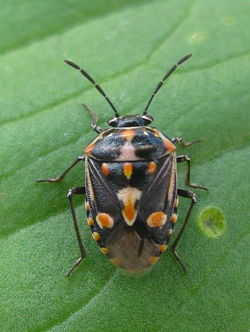Difference between revisions of "Bagrada hilaris"
From Pestinfo-Wiki
| Line 4: | Line 4: | ||
<font color="#800000">'''''Bagrada hilaris'''''</font> (Burmeister, 1835) - (Bagrada bug, painted bug) | <font color="#800000">'''''Bagrada hilaris'''''</font> (Burmeister, 1835) - (Bagrada bug, painted bug) | ||
| − | The bug is native to Asia, Africa and some parts of the Mediterranean where it feeds mainly on crucifers. It has been recorded from the south-western U.S.A. since 2008 and has become a serious economic problem there on cruciferous vegetables. | + | The bug is native to Asia, Africa and some parts of the Mediterranean where it feeds mainly on crucifers. It has been recorded from the south-western U.S.A. since 2008 and has become a serious economic problem there on cruciferous vegetables. In addition it can invade houses, become a nuisance pest, cause allergies and even bite humans ([[Journal of Medical Entomology (2018) 55, 1365-1368|Faúndez, 2018]]). |
The bug forms aggregations of hundreds of insects. Their feeding activities result on malformation and wilting. Yield losses often exceed 10%. The life cycle from egg to adult lasts around 1-2 months, it overwinters in the adult stage. | The bug forms aggregations of hundreds of insects. Their feeding activities result on malformation and wilting. Yield losses often exceed 10%. The life cycle from egg to adult lasts around 1-2 months, it overwinters in the adult stage. | ||
Revision as of 20:26, 9 December 2018
| Literature database |
|---|
| 50 articles sorted by: |
| • year (recent ones first) |
| • research topics |
| • countries/regions |
| • host plants |
Bagrada hilaris (Burmeister, 1835) - (Bagrada bug, painted bug)
The bug is native to Asia, Africa and some parts of the Mediterranean where it feeds mainly on crucifers. It has been recorded from the south-western U.S.A. since 2008 and has become a serious economic problem there on cruciferous vegetables. In addition it can invade houses, become a nuisance pest, cause allergies and even bite humans (Faúndez, 2018).
The bug forms aggregations of hundreds of insects. Their feeding activities result on malformation and wilting. Yield losses often exceed 10%. The life cycle from egg to adult lasts around 1-2 months, it overwinters in the adult stage.
For a review see Palumbo et al., 2016
